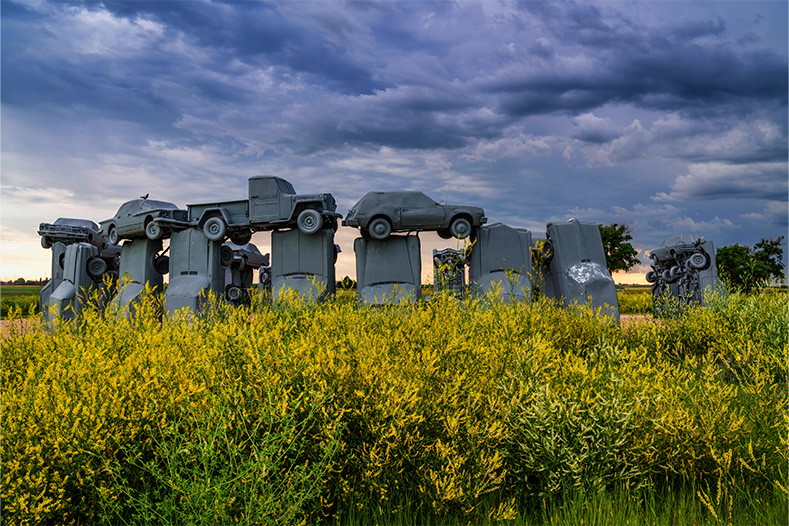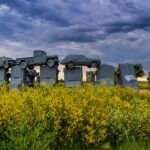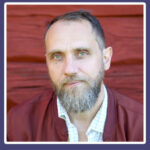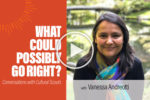“If the world is made of problems to be solved, then to admit you are out of solutions is to reach the end of the world.”
– Dougald Hine, At Work In the Ruins
Anyone reading this right now is likely inhabiting the world of high-energy modernity – enjoying the benefits, and increasingly feeling the consequences, of a fossil-fueled frenzy of mechanization, industrialization, and exploitation of people and nature. But modernity is more than just the highly complex physical, social, and economic fabric of our lives. It is a story, as Vanessa Andreotti and Dougald Hine argue in their seminal books, Hospicing Modernity and At Work in the Ruins – a story of inevitable growth and progress so deeply embedded in the consciousness of our culture and institutions that is not conscious at all. For much of humanity and the more-than-human world, that story has already been a tragedy. But now both the story and the real-world manifestations of modernity may be expiring.
In this online event, Vanessa Andreotti and Dougald Hine held a rich and honest discussion to explore the promise and consequences of modernity, the implications of its decline, and how we – individually and collectively – can hospice what is dying and give care to what may emerge.
Event Recording
For the first three months following an event, event recordings are exclusively available to Resilience donors.
Already made a donation? We emailed you instructions to watch the recording a few days after the event.
Didn’t receive an email? We’re currently troubleshooting email deliverability issues to @yahoo.com and @aol.com accounts; please accept our apologies, and thank you for your patience.
Contact us with any questions.
About the panelists
Vanessa de Oliveira Andreotti has worked internationally in education related to global justice, Indigenous knowledge, and environmental crises. She is the Dean of the Faculty of Education at the University of Victoria and author of Hospicing Modernity: Facing Humanity’s Wrongs and the Implications for Social Activism. Vanessa is a co-founder of the Gesturing Towards Decolonial Futures Arts/Research Collective and co-designer of the course Facing Human Wrongs: Climate Complexity and Relational Accountability.
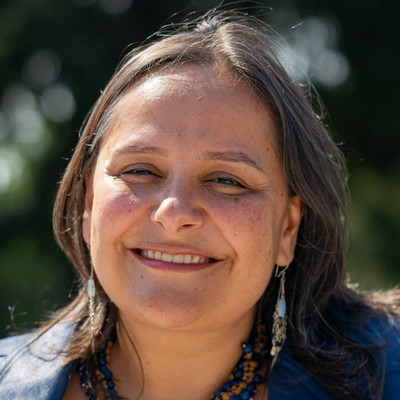
Dougald Hine is a social thinker, writer and speaker. After an early career as a BBC journalist, he went on to co-found the Dark Mountain Project, where he was the director until 2019. He co-authored, with Paul Kingsnorth, Uncivilisation: The Dark Mountain Manifesto and authored in 2023 At Work in the Ruins: Finding Our Place in the Time of Science, Climate Change, Pandemics & All the Other Emergencies. Dougald’s latest writing can be found on his Substack, Writing Home. He is also co-creating a school called HOME, “a gathering place and a learning community for those who are drawn to the work of regrowing a living culture.”
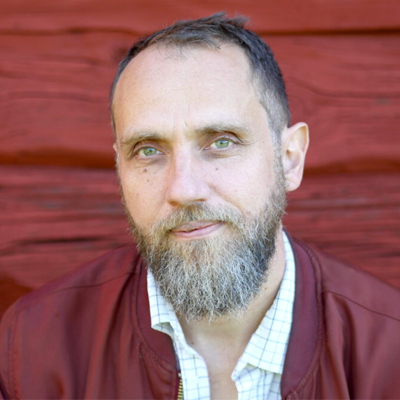
Related Resilience Posts
Resources Related to Dougald Hine
- To learn more about Dougald, check out his website
- Dougald’s book – At Work in the Ruins: Finding Our Place in the Time of Climate Crises and Other Emergencies. (For a 35% discount on Dougald’s book through Chelsea Green, use this code at checkout: CG35.)
- Dougald’s ongoing writings can be found at Writing Home
- Dougald and Paul Kingsnorth book, Uncivilisation: The Dark Mountain Manifesto
- “Dougald Hine: Reimagining the Cultural Narrative: Art and Storytelling for Systemic Change,” interview with Nate Hagens
Resources Related to Vanessa Andreotti
- To learn more about Vanessa, check out her faculty page at the University of Victoria.
- Vanessa’s book – Hospicing Modernity: Facing Humanity’s Wrongs and the Implications for Social Activism. (For a 30% discount and free shipping on Vanessa’s book, use this code at checkout: MODERNITY.)
- Vanessa’s forthcoming book is called Outgrowing Modernity: Navigating Complexity, Complicity, and Collapse with Accountability and Compassion (August 2025)
- Vanessa’s provocation, “Landing with the Land Differently – An Invitation”
- Visual of the House Modernity Built
- Gesturing Towards Decolonial Futures Arts/Research Collective
- The online course, Facing Human Wrongs: Climate Complexity and Relational Accountability
Resources Shared by Participants
Below is a list of specific resources shared by participants during the live event. We are not sharing the full chat transcript and are only referencing participants’ first names in order to respect privacy and to encourage honest sharing. Resources are shared in chronological order.
- Alan:
- Vanessa’s words remind me of Daniel Quinn’s Ishmael. (Note from Asher: The first season of the Human Nature Odyssey podcast does a beautiful job of exploring Ishmael, and Tom Murphy – a regular contributor at resilience.org – is currently publishing a series of essays on the book.)
- The Road Salt Project
- Peter: My website – Dawn of the Attention Age. My next book will be titled Extinction at the Dawn of the Attention Age.
- Jeremy: A new book from Kalle Lasn which may be of interest, Manifesto for World Revolution: A compelling vision of a non-violent grassroots insurgency
- Rob: The book that Dougald referenced is And Our Faces, My Heart, Brief as Photos by John Berger
- Root: Martín Prechtel: Boald’s Kitchen
- Florian: I’m reminded of Manda Scott’s work about trauma culture vs initiation culture, and the concepts she infused in her latest book Any Human Power.
- Root: Other things by Manda Scott:
- Ken: Another book that may be of interest is Bruno Latour’s Down to Earth: Politics in the New Climatic Regime. One of his main points is that there is a coordinated strategy to fund a campaign of climate change denial while shredding the social safety net and exploding inequality. Hard to refute that as we look at what is unfolding today (the book was published in 2018).
- Toby: I think there are elements on the left who do NOT work to preserve the house of modernity. E.g., Japanese Marxist author Kohei Saito’s Slow Down: The Degrowth Manifesto
- Root:
- The Haudenosaunee Great Law of Peace
- The story of the Journey of the Peacemaker
- Gurpreet: Venture Capital Extremism
- Root:
- How to Lose a Country: the 7 Steps from Democracy to Dictatorship by Ece Temelkuran
- Bayo Akomolafe’s essay: “The Times Are Urgent, Let’s Slow Down”
- Carla: Our newsletter that just came out, which starts with thinking about the Adaptive Cycle as a lens for thinking about the times we find ourselves in. We do rural development work in North Carolina, US and we are seeing real shifts recently in how people are thinking, which makes room for new ways of thinking and relating.
- Lebo: Asase Harmony, living in harmony as nature.
- Benjamin: Many of you might have read Die Wise: A Manifesto for Sanity and Soul (Stephen Jenkinson) but highly recommend it for any who have not. From that perspective, I’d ask the question – who does it serve to try to accelerate/slow down the death of a loved one? Is either of those the right thing? Also, what role does hope play in the reality of terminal illness? Is it helpful? Hope seems to be another way to join the cult of “one more day”, or “more time”, instead of really helping to die wise.
- Gottfried: Ivan Illich’s Tools for Conviviality
- Claude: My podcast explores some of these issues through the lens of the arts. For example, later this week I’ll publish an interview with GTDF collective member Azul Caroline Duque. Also engaging artists in roundtable conversations to deepen dialogue…
- Jim: In EF Schumacher’s Small is Beautiful: Economics as if People Mattered, he identifies, as Vanessa seems to, that education is our greatest asset!
- (Later note from Ken: While Small is Beautiful is an important work, Schumacher considered A Guide for the Perplexed to be the culmination of his life’s work.)
- Gottfried: Jem Bendell’s Breaking Together – A Freedom-Loving Response To Collapse
- Root: Rob Hopkins’ From What Is to What If: Unleashing the Power of Imagination to Create the Future We Want. (Note from Asher: Rob has a new book coming out this summer.)
- Ardell: Free resource to connect people for local resource sharing especially residential intentional community: CooperativeLivingCommunities.org
- Alan: Re death, see my website soulresilience.net
- Ken: Another step in composting/hospicing modernity and de-centering humans as the most important species is to redefine what constitutes intelligence: “The case for expanding the definition of intelligence”
- Root: A few resources from Emily and Amelia Nagaski:
- Julie: One very good resource for calming the nervous system and staying present and in action is this somatic work: How to Stay Embodied During Global Crisis
- Ruth: For peer support for processing and metabolising grief about the end of modernity, please see our website: Climate Grief Support. We use the 10-Step program developed by the Good Grief Network, another excellent resource. It’s about being with what is, building capacity, and discovering what is ours to do: “10 Steps to Resilience & Empowerment in a Chaotic Climate.”
- Point taken about too many podcasts and how they can distract from composting work. I feel the need to slow down while still offering resources and engagement. The balance is tricky. I tried to think about it through here: “a conscient rethink”
- Devlin: The essay by Alana Newhouse that Dougald referenced is called “Brokenism”
- David: Ayurveda is an incredible modality to help reteach your body how to live with the seasons and cycles, building internal/personal resiliency allowing you to be less reliant on western medicine. There is a program specifically designed for women worth exploring if you’re ready to do deep into community and soul work: Heartfelt Wellbeing.
- Susana: My teacher for embodied resilience: Lumos Transforms. Their work is truly unique and we’re now global.
- Susannah: The Order of the Good Death
- Ken: A quote from Vandana Shiva: “And I’ve learned from the Bhagavad Gita and other teachings of our culture to detach myself from the results of what I do, because those are not in my hands. The context is not in your control, but your commitment is yours to make, and you can make the deepest commitment with a total detachment about where it will take you. You want it to lead to a better world, and you shape your actions and take full responsibility for them, but then you have detachment.”
- Root: Not Too Late: Changing the Climate Story from Despair to Possibility edited by Rebecca Solnit and Thelma Young Lutunatabua
- Sandra: HumanEcologyEdu.com
- Root: Cooperationhumboldt.com/
- David: Our small community in Appalachia was spared the wrath of Hurricane Helene but it really allowed us to start the uncomfortable conversations about all the potential existential crises and how we might meet them as a community. The result is a list of free skillshare opportunities and an emergency preparedness fair in 2 weeks. We hope to be an example for other communities to engage people across cultural and political ideals and create solidarity and awareness.
- ayreAnna: hearing you speak about sharing the pain collectively makes me think of Joanna Macy’s work- the Truth Mandala. such a powerful gathering.
- Margaret: Ayana Elizabeth Johnson’s books are a good resource. Her TED Talk.
- David: The Serviceberry: Abundance and Reciprocity in the Natural World by Robin Wall Kimmerer
- Julie: Pachamama Alliance does great work expanding on Joanna Macy’s work around processing grief to be able to get into action.
- Alice: My work in the Ohio River Valley, USA: Field Speak
- Ivan: A resource to share with others who want to become more familiar with our situation: Collapsonomics.
- Mike: I haven’t been watching the chat but in case it wasn’t mentioned, Tom Murphy’s recent series on “Metastatic Modernity” is a great resource if you need any convincing about (or just another perspective on) our current moment in history. (Note from Asher: You can also check out the recent conversation Tom had with me, Rob Dietz, and Jason Bradford on the Crazy Town Podcast.)
- Ruben: For some new mental models of modernity and why it is now disintegrating this video may be helpful: “The Root (Meta) Challenge of the 21st Century: Why Don’t We Get it?”
- Beverly: Rest Is Resistance: A Manifesto by Tricia Hersey
